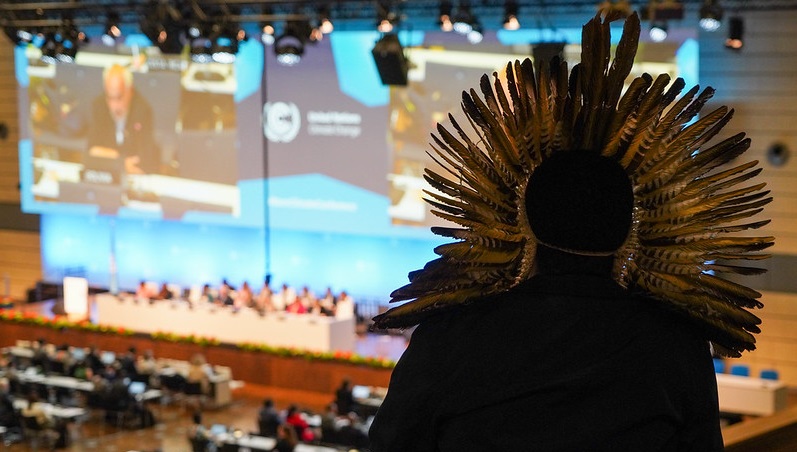With governments unable to agree on agenda, all the negotiations so far in Bonn could go to waste
Seven days into climate talks in the German city of Bonn, governments have not been able to agree on an agenda, sparking fears of two wasted weeks of talks while the climate crisis worsens.
Talks on issues like reducing emissions and adapting to climate change have continued but the Pakistani co-chair of the talks Nabeel Munir warned that all their work could be wasted if the agenda is not officially adopted.
Towards the end of a two-hour open meeting, Munir told negotiators they were like “a class of primary school” and urged them to “please wake up, what is happening around you is unbelievable”. The room of negotiators and campaigners applauded his words.
Munir said 33 million people had been impacted by floods in Pakistan last year, worsened by the climate crisis. “A third of the country [is] under water and I go back and tell my people that we were fighting for agenda for 2 weeks. Come on, is it worth it?” he said.
The Overshoot Commission is talking about solar geoengineering. Not everyone thinks it should
Urging agreement, Zambia’s lead negotiator Ephraim Mwepya Shitima warned there was a “danger” of losing progress, affecting “the credibility of the process” and “even disrupting some of the critical functions of the [UN climate change agency] if we leave this places without adopting the agenda”.
The Bonn talks happen every June and allow negotiators to progress technical talks and prepare the ground for the following Cop summit each November. A failure to agree an agenda in Bonn would make constructive talks at Cop28 difficult.
The last time they collapsed without an agenda being agreed was in 2013, when Russia objected to being ignored at the previous Cop meeting in Qatar and insisted on discussing that in Bonn.
Finance split
Developed countries and some developing nations are split on how prominent to make climate finance on the agenda.
A group of developing countries want an agenda item on “urgently scaling up financial support from developed country parties” to be added.
Rich world’s leaders fail to commit to Paris global financing summit
But developed countries and some more climate vulnerable developing ones oppose this, arguing that the agenda item was proposed too late and that finance is discussed elsewhere in climate talks.
This second group wants an agenda item on talks, known as the mitigation work programme, to reduce emissions to give the world a better chance of limiting global warming to 1.5C. But the first group opposes this, without their agenda item being included.
The push
Bolivian negotiator Diego Pacheco, who represents the Like-Minded Developing Country coalition, made the first group’s arguments most prominently yesterday.
“In our hunger for action, discussions have centred exclusively on scaling up ambition against the backdrop of broken promises, failed commitments and low delivery of means of implementation and support from developed countries,” Pacheco said.
World Bank set to take on risk of insuring carbon credits amid market upheaval
Speaking on behalf of the G77+China group, which includes all developing countries, Cuba’s negotiator Pedro Luis Pedroso Cuesta said an agenda item on finance was “long overdue” as the “promised finance hasn’t been there since 2009”.
It is clear that there is no intention to talk about financing… Muy despite the fact that on a day like today in 1992 in Rio, this United Nations Framework Convention on Climate Change was opened for signature, @UNFCCC, let’s live up to it and stop talking nonsense.#CubaqG77 pic.twitter.com/mdbFmkOXtZ
— Pedro Luis Pedroso C (@PedroPedrosoC) June 12, 2023
In 2009, developed countries collectively promised to deliver $100 billion a year by 2020 to developing countries to help them reduce emissions and adapt to climate change. They failed to do so and have yet to reach this target, although they expect to this year.
Cuesta yesterday said the $100 billion promise was a “fraud” and that developing countries need somewhere between $6,000 billion and $100,000 billion.
At Cop28, countries will renew discussions on a new climate finance target set to be adopted by 2024, which is expected to supersede the previous $100 billion finance goal. But negotiations at last year’s Cop27 did not resolve substantive matters yet, such as the exact amount of the new goal.
The Arab group proposed a new goal of $1.1 trillion per year by 2030, while a report commissioned by the UK presidency of Cop26 estimated a similar amount of $1 trillion needed for developing countries (excluding China) to reduce emissions and adapt to climate impacts.
Tom Evans, policy advisor at E3G said developed countries were keen to see other major emitter
Read More

